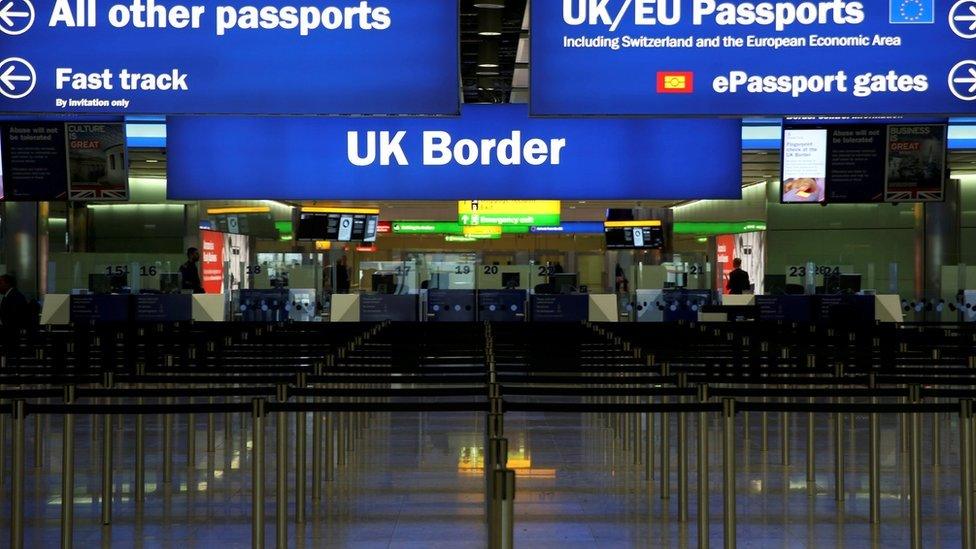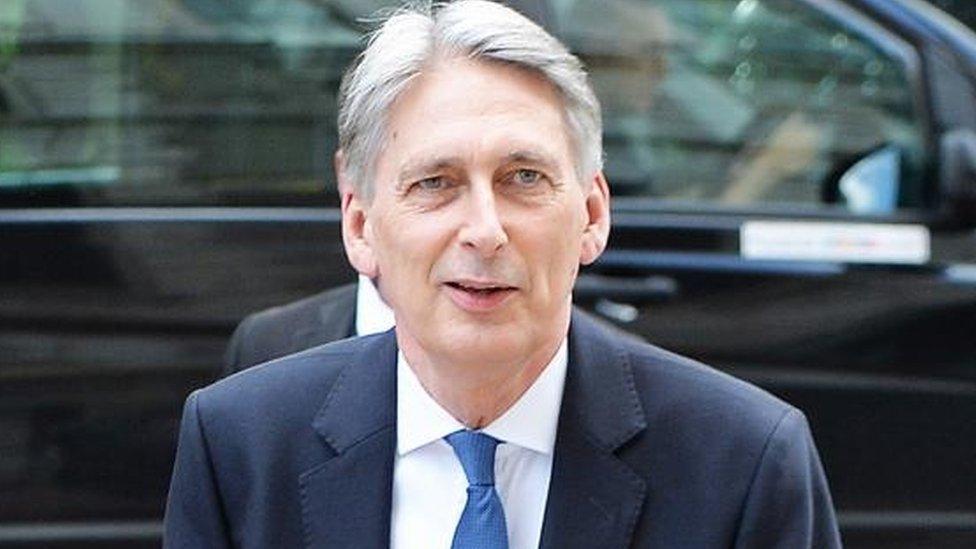Immigration - the Brexit dividing line
- Published
- comments

Three days after Theresa May called the general election, I interviewed the chancellor about what we could expect from any new Tory government.
On tax the signal was clear.
Philip Hammond was no fan of the triple tax lock David Cameron promised voters before the 2015 election - no increase in income tax, national insurance contributions or VAT.
He suggested the lock should be dropped, and it was.
Towards the end of the interview I turned to immigration and, given the events of last Thursday, it is worth going back to the exchange.
And understanding that Mr Hammond's backing for an immigration target of "tens of thousands" per year is at best luke-warm.
I asked the chancellor: "Immigration is a big issue for businesses - skilled and less-skilled immigration coming into the country. Do you agree that immigration in the UK should be brought down to the tens of thousands even though many businesses say that will damage economic growth?"
Mr Hammond replied: "What businesses want to do is bring skilled migrants in, move skilled migrants around their global businesses to do the jobs that are open in the UK.
"No businesses are unable to bring skilled workers into the UK to work in their companies because we have run out of space on a visa cap.
"At the moment we cannot control migration from the European Union into the UK. That situation will end.
"We will regain control of our borders and we will use that control to manage the migration system in the interests of our economy and our society. "
Me: "Do you think it should be brought down to the tens of thousands a year, immigration in the UK?"
Mr Hammond: "We've got to get migration back to sustainable levels; we've got to focus on skilled migration. The Prime Minister has made it very clear that she believes that needs to be tens of thousands a year."
Me: "Do you believe it?"
Mr Hammond: "The Prime Minister has been very clear that is the target that we are going for - tens of thousands."
'Global battle'
Mr Hammond is a careful man.
And the fact that he refused to say directly that he supported the target is worthy of note.
Those close to the chancellor have revealed his concern.
Far from putting up barriers to immigration, many in the Treasury believe that Britain will be engaged in a "global battle for immigrants" to support the economy.

Mr Hammond's position in government has strengthened
Now, that is not to say that Mr Hammond is in favour of free movement of people from the EU.
As he made clear to me, "that situation will end".
And nothing has changed sufficiently enough since last Thursday to alter that.
Which seems to me to rule out unfettered membership of the single market unless the European Union decides to reform one of the four principles of membership - open borders.
And the chance of that appears vanishingly small.
What has changed is that Mr Hammond is much strengthened in government - as Theresa May has been weakened.
Many in Number 10 were no fans of the Treasury and wanted to curtail its influence at the centre.
That power relationship has shifted.
And Mr Hammond's reluctance to back an immigration numbers target has become much more significant.
"Jobs and skills" to support the economy will be a new mantra in the Brexit discussions - pushed by the chancellor.
'Softer' Brexit?
Carolyn Fairbairn, the director general of the CBI writing in this morning's Financial Times, external, talks about the need for "access to the skills and labour companies need to grow".
My colleague Simon Jack reports this morning that businesses feel their voice should now be heard more loudly.
Michael Gove's reappearance in the Cabinet provides another "pro-skills" voice.
Yes, Mr Gove is a firm Brexiter, but of the "open-but-controlled borders" variety.
"People who come here who have got skills that can contribute to our economy are welcome," he said during the referendum campaign.
There is much talk that a "soft" Brexit may now be more likely given the perceived weakness of the Prime Minister.
As far as "soft" means an economically closer relationship with the EU - and a more porous approach to immigration controls - that certainly appears to be the case as far as the chancellor is concerned.